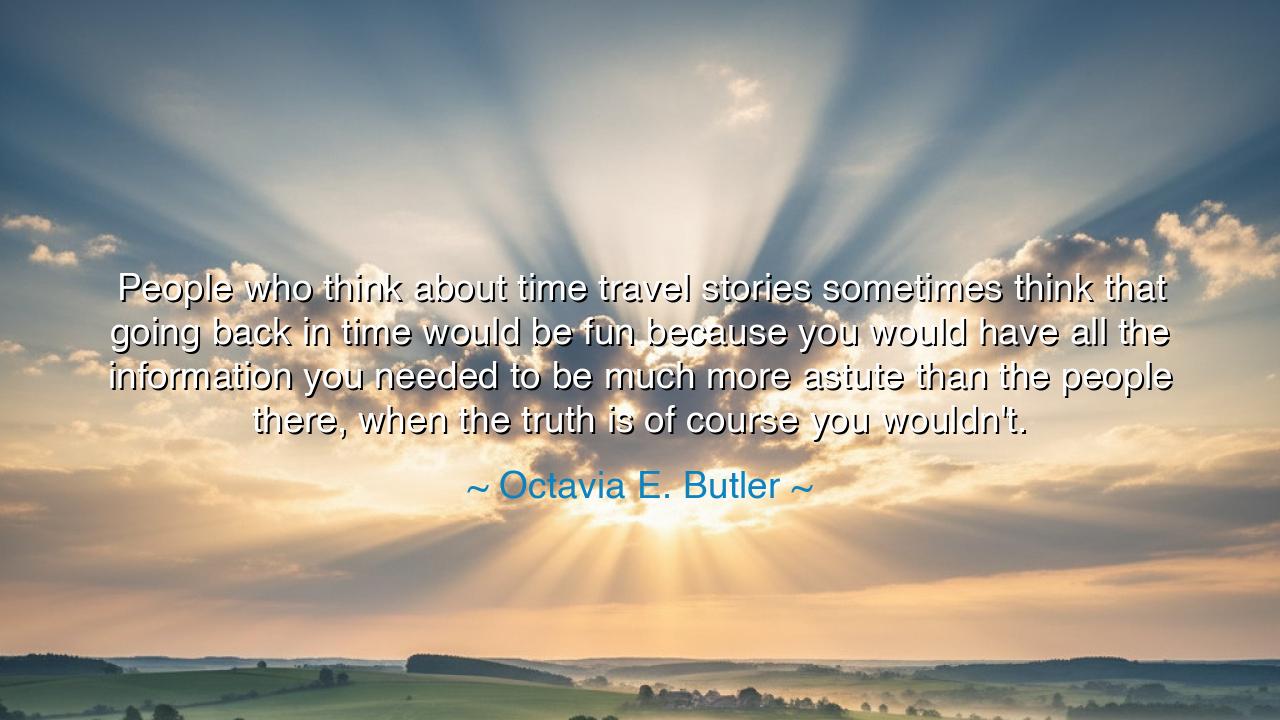
People who think about time travel stories sometimes think that
People who think about time travel stories sometimes think that going back in time would be fun because you would have all the information you needed to be much more astute than the people there, when the truth is of course you wouldn't.






"People who think about time travel stories sometimes think that going back in time would be fun because you would have all the information you needed to be much more astute than the people there, when the truth is of course you wouldn't." Thus spoke Octavia E. Butler, master of speculative vision and prophetic wisdom. Her words are not merely about the fantasy of time travel, but about the arrogance of imagining ourselves wiser than those who lived before us. In this saying, she strips away the illusion that knowledge alone makes one powerful, reminding us that wisdom is not the same as information, and survival requires more than memory.
The ancients would have understood this well. The Greeks told of Oedipus, who knew riddles but could not escape fate. The Hebrews told of Lot’s wife, who looked back with knowledge but perished in disobedience. In all ages, men have believed that if only they knew more, they would master destiny. Yet Butler declares that this is false. To walk in another time is to be as vulnerable as those who live there, stripped of the context, the customs, and the daily wisdom that true survival requires.
Think of her own tale, Kindred, where a modern Black woman is hurled into the world of slavery in the American South. The heroine possesses all the historical knowledge that schools and books could give her, yet this knowledge does not shield her from the whip, the laws, the suffocating structures of that age. She learns that to live in that time, she must adapt, endure, and fight within its brutal conditions. Butler’s point is sharp: information alone does not make you superior to the past—you must live the reality to understand it.
History itself confirms this. Imagine a scholar of the twenty-first century transported to the plague-stricken Europe of the fourteenth. He may know that germs spread disease, but without antibiotics, without sanitation systems, without the weight of modern infrastructure, his knowledge is like a candle in a storm—flickering, fragile, nearly useless. Or consider a physicist of today cast into ancient Babylon. He may know the laws of celestial motion, but without instruments, without peers, without the culture that sustains inquiry, his brilliance may appear as madness, or worse, heresy. Butler reveals that we deceive ourselves if we think our knowledge would make us lords of the past.
There is humility in her teaching. For we are tempted to look upon our ancestors as simple, blind, unenlightened. But to live in their world required strengths we may not possess: to plant and reap, to endure hunger, to walk without maps, to survive without modern medicine or technology. In many ways, they were more astute in the art of survival than we are, for they were shaped by their world just as we are shaped by ours. To think ourselves greater is not wisdom but pride.
O children of tomorrow, take this lesson deeply: do not despise the people of the past, nor imagine yourself their master. Knowledge is precious, but it is only one form of power, and it cannot replace experience, culture, and the bonds of community. Respect those who came before you, for their lives, though bound by hardship, contained a knowledge of endurance we may never recover. And do not imagine that if you were placed in their world, you would fare better—you would be as vulnerable as any.
Therefore, walk with humility toward both past and present. Use your knowledge not as a weapon of pride but as a tool of compassion. Seek not only to know, but also to understand—to feel the weight of other lives, other times, other struggles. For this is the greater wisdom Butler offers: that true mastery is not in thinking yourself superior to others, but in listening, learning, and honoring the realities that shaped them.
Thus her words endure: the fantasy of conquering the past is folly. But the practice of humility, empathy, and respect is eternal. Carry this into your own days, and you will live not as a proud pretender of wisdom, but as a true seeker of understanding.






AAdministratorAdministrator
Welcome, honored guests. Please leave a comment, we will respond soon